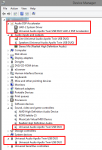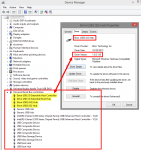Storyteller
Active Member
Hi everyone,
I received my Apollo Twin USB Duo the day before yesterday and it worked as an interface, but not as an audio interface. I did everything posted on the UA support page, but still couldn't get this thing to work (it talked to the PC, I could insert Plugins and play the guitar through it, but I wasn't able to get audio in and out of the PC).
The solution was buried deep in the documentation of the motherboard... on the back panel of the motherboard itself there are 4 USB 3.0 connectors, and none of them worked for the Apollo. The block diagram of the MoBo revealed that those USB ports are mounted on the back panel, but connected via the PCI express bus and a VIA chip, which means they are essentially mounted as an extra PCIe card, although they appear to be connected directly to the board.
After plugging the Apollo to a front USB3 connector it started working.
Hope this helps, Storyteller
I received my Apollo Twin USB Duo the day before yesterday and it worked as an interface, but not as an audio interface. I did everything posted on the UA support page, but still couldn't get this thing to work (it talked to the PC, I could insert Plugins and play the guitar through it, but I wasn't able to get audio in and out of the PC).
The solution was buried deep in the documentation of the motherboard... on the back panel of the motherboard itself there are 4 USB 3.0 connectors, and none of them worked for the Apollo. The block diagram of the MoBo revealed that those USB ports are mounted on the back panel, but connected via the PCI express bus and a VIA chip, which means they are essentially mounted as an extra PCIe card, although they appear to be connected directly to the board.
After plugging the Apollo to a front USB3 connector it started working.
Hope this helps, Storyteller
Attachments
-
88.6 KB Views: 89






